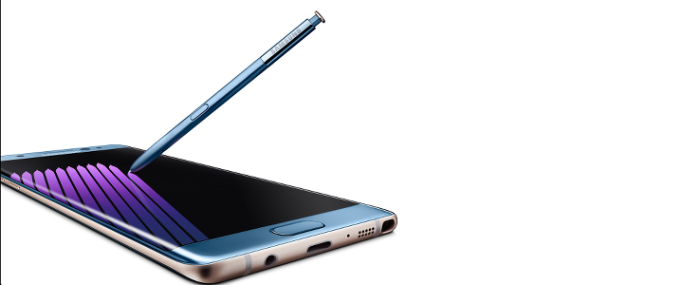
© samsung
Analysis |
Who will benefit from the end of Samsung's Galaxy Note 7
It was a short lived flagship model. Introduced in in August 2016 and scheduled to ship at the end of the month. One month and Samsung issued a global recall following problems with units heating up and catching fire – and we all know what happened next.
On October 11, Samsung issued a second recall, and then permanently ceased production of the Note 7. On issue still remains here though – the true cause of the problem is still unclear.
So the question is, who will claim the space on the market left by the Note 7?
IHS Markit mean that Samsung’s competitors were caught by surprise by the Note 7 recall. A lot – if not most – smartphone makers chose not to release any large screen smartphone models (5.5” and greater) at this time of year. Mainly because they would go head to head with Samsung’s Note and the iPhone 7 & 7 Plus. As a result by this choice they are poorly placed to raise sales quickly in reaction to the Note 7 recall.
Google’s new premium Pixel smartphone may look to be arriving at the ideal time, IHS points out.
However, IHS estimates Pixel production is under one quarter of Samsung’s original planned Note 7 volume which limits Google’s ability to replace the Note’s market position.
Another issue is the fact that Google’s mobile operator exclusives – EE in the UK, Verizon in the US, Telstra in Australia – mean that many Note 7 buyers using other networks will not be able to switch to a Pixel all that easily due to being tied into existing operator contracts.
“Other Android OEMs have few phablet smartphones on offer globally: In the US, LG is launching the V20, but it also has low planned production volumes and it has extremely limited availability in Europe. Huawei may choose to accelerate the launch of its upcoming Mate smartphone but its P9 flagship has a modest 5.2” display much smaller than the Note 7’s 5.7” screen. Sony, HTC, and ZTE have no recent large screen premium smartphone to offer,” IHS writes in its analysis.
Samsung’s expected strategy in this is that the company will try to counter its competitors by marketing the S7 and S7 Edge, most likely by reviving Gear VR headset bundles with new S7 sales.
However, as IHS puts it, the level of success that the company will active is completely depended on the extent of damage that the Note 7 issue had on the Samsung brand.
“Even more importantly, Samsung must urgently diagnose the precise cause of Note 7 failures to ensure that upcoming smartphone models, which may share design elements and components with the Note 7, do not suffer the same fate. Every other smartphone maker will be reviewing their engineering approaches as well, to ensure they do not have similar problems in future,” IHS adds in the analysis.
IHS expects Apple to raise iPhone 7 production significantly to meet increased demand, especially of the larger Plus model. Unlike Google's Pixel, V20 or the upcoming Huawei Mate, the iPhone 7 Plus is available now. Apple has repeatedly claimed large volumes of iPhone buyers are Android switchers. The Note 7 recall will be an excellent market test of the strength of Apple’s appeal to Android owners.
Beyond the short term impact, Huawei will be the biggest beneficiary from any brand damage to Samsung, says IHS. Huawei has already been performing strongly and has moved into a clear third position in global smartphone shipments – behind Apple and Samsung – and aims to be number one. Like Samsung, it uses Android and offers smartphones at a wide range of prices. Huawei will look to pick up sales right across its portfolio, assuming it is Samsung’s brand which has been hurt, and not solely the Note brand.

